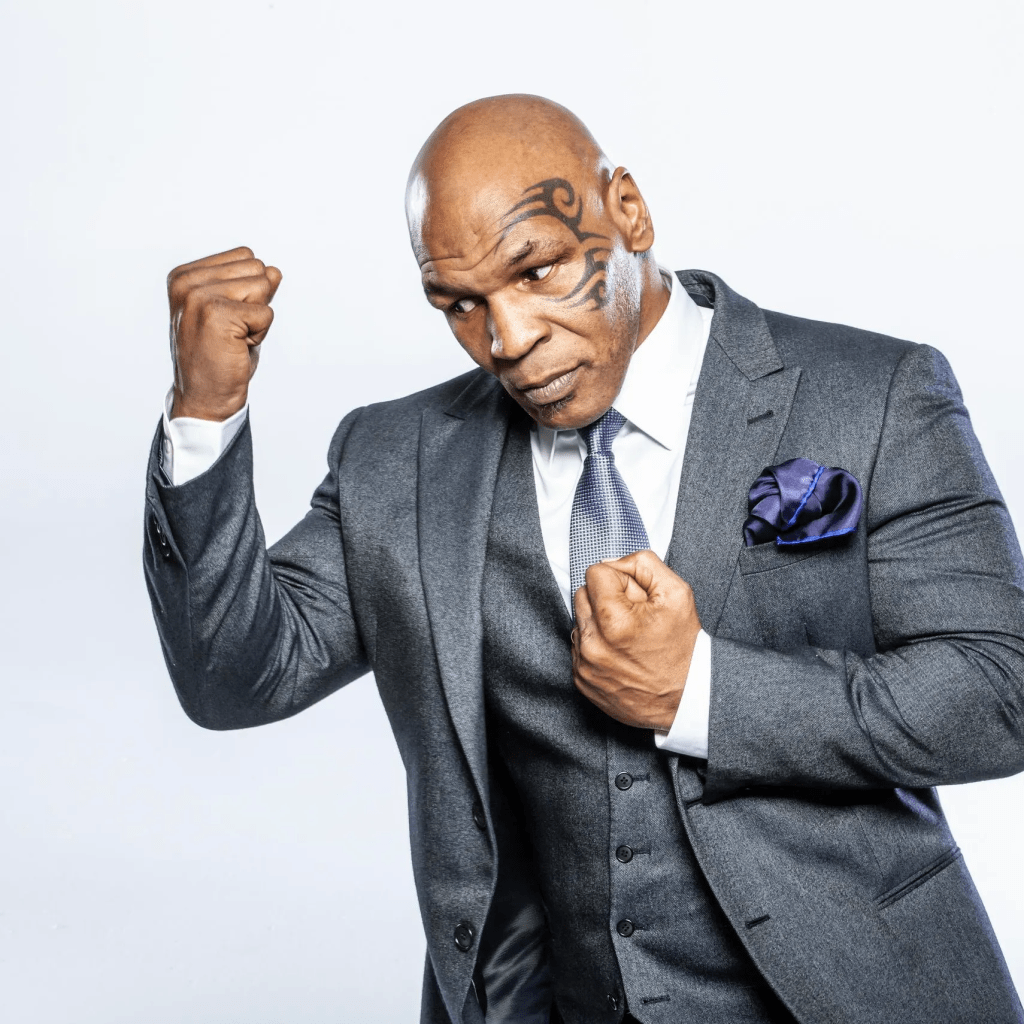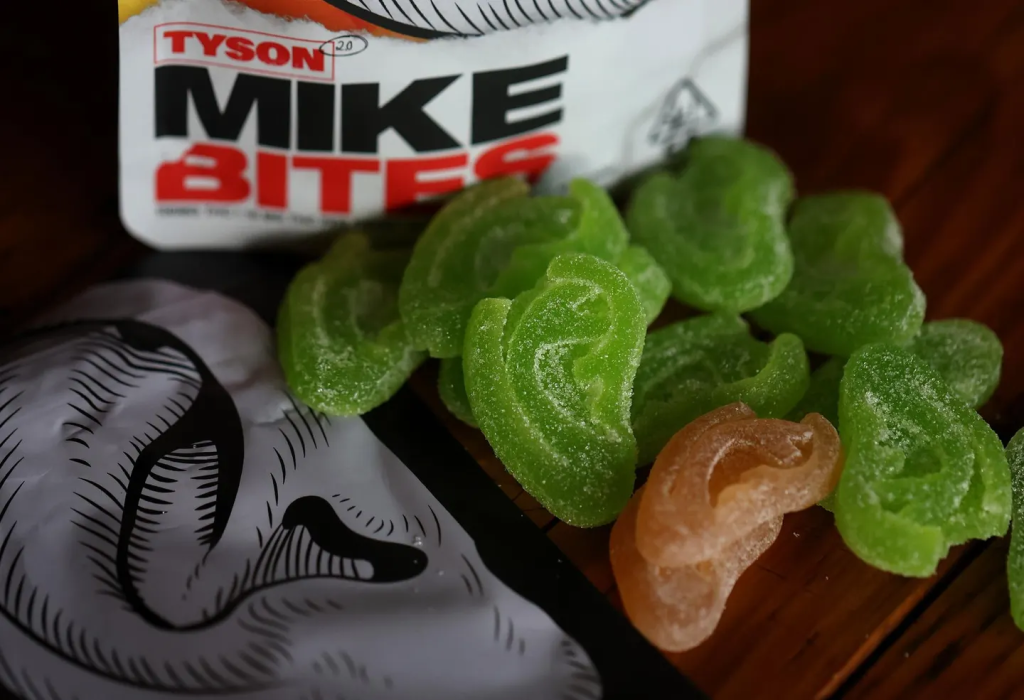The former heavyweight champion and cannabis mogul (with ear-shaped gummies) on how pot changed his life—and the secret weapon that will help him smoke Jake Paul in their fight.

When Mike Tyson, the former undisputed heavyweight champion of the world, walked across Times Square on April 20, all hell broke loose.
A taxi driver screeched to a halt, put his hands together as if in prayer and shouted: “I love you, Mike! God bless.”
A group of tourists caught a glimpse of the 57-year boxer and chased after him like a school of wild-eyed fish. Even busy New Yorkers, with somewhere better to be, stopped and screamed: “It’s Iron Mike, y’all!”
As Tyson stepped behind a metal fence on Seventh Avenue and 43rd Street, a mother threw her toddler over in hopes he would bless the child with whatever power the ex-champ still possesses.
But Tyson—the onetime “baddest man on the planet”—isn’t in New York to fight.
Rather, the kid from the Brownsville section of Brooklyn is here to ring in 420, the cannabis high holiday, and promote the expansion of his cannabis brand, Tyson 2.0, to his hometown—as well as a new collaboration with marijuana seed bank Royal Queen Seeds.
“The sky is the limit,” says Tyson, who is a cofounder and chief brand officer of the Las Vegas-based weed brand. “I was the champ of the world and now I’m the champ in cannabis. We’re going to conquer the world. We want to be in every country on the planet.”
While Iron Mike was prone to being his own hype man as a fighter, he’s not far off with his claims about his budding cannabis company.
Tyson 2.0 sells marijuana products—including flower, vapes and edibles made in the shape of Evander Holyfield’s ear, which Tyson notoriously bit during a 1997 match—in 20 states across the U.S., and in Amsterdam, Barcelona and Thailand.
The company, through a partnership with PHCANN International in Macedonia, is in the process of launching in Germany’s newly legalized adult-use market as well as the U.K.’s highly restrictive medical marijuana industry.
Tyson 2.0 works off a licensing model, cutting deals with franchisees who grow, manufacture, and sell his branded cannabis products.
In 2023, the brand generated $150 million in revenue, Forbes estimates, with about 30% coming from cannabis sales and the rest from accessories, CBD, nicotine vaporizers and other products.
Tyson 2.0’s flower is branded with names drawn from his legendary boxing career, including Dynamite Cookies (his first nickname was Kid Dynamite) and Knockout OG (Tyson won 44 of his 50 boxing career wins by KO).
But the company’s flagship product Mike Bites—the edible in the shape of Holyfield’s half-bitten ear—was developed by Tyson’s wife, Kiki.
“My wife is a nut, but she’s brilliant,” Tyson says. “And [one day] she said, ‘Why don’t you use the ear?’”
At first, he hated the idea.
“‘Get out of here,’” he remembers telling her. “I was a little bitter because the ear got me in a lot of trouble.”
But then he realized she was onto something.
“Why am I the face of cannabis and psychedelics?” Tyson asks. “I can’t even spell cannabis and psychedelics.”
The decision, while controversial, has paid off. In the highly competitive $28 billion legal cannabis market, celebrity-backed brands usually do not do well.
But Tyson 2.0 enjoys the position as the industry’s best-selling celebrity brand, according to cannabis data firm Headset.
“You know what’s funny? When I bit Holyfield’s ear, they took $3 million from me,” he says, explaining the ear incident was the lowest point in his career. “I made more than that taking pictures of biting other people’s ears. Me and Holyfield are the only people still making money from a fight 30 years ago.”

Founded in 2021, Tyson 2.0 is wholly owned by Las Vegas-based Carma Holdco Inc., which Tyson cofounded with private equity and cannabis entrepreneur Adam Wilks.
Tyson is one of the largest shareholders in the company, which also owns wrestling legend Ric Flair’s cannabis brand—Ric Flair Drip—and Grammy-winning hip-hop artist Future’s weed line EVOL.
Weed has been a part of Tyson’s life since his childhood in Brownsville, where his mother was a sex worker—or as he says, “a lady of the night.” He still doesn’t know exactly who his father is but he was told a pimp named Curly Kirkpatrick was his father while growing up.
His first experience with marijuana was when he was young boy.
“I’m crying and my mother’s friend says, ‘Hey, I’ll give him something’ and she let me smoke,” he recalls. “And I never stopped.”
Tyson grew up committing crimes and getting in trouble—by the age of 12, he has said, he had been arrested 38 times.
But after being sent to reform school in upstate New York, he caught the eye of Cus D’Amato, a legendary trainer, who helped him become the youngest ever boxer to win the heavyweight championship at 20.
Kid Dynamite eviscerated his competitors—he won his first 37 fights, nearly all of them knockouts. But in 1996, he was arrested in Indiana and convicted of rape—serving three years in prison—a charge he denies to this day.
In 2009, his four-year-old daughter died in an accident and he struggled with an addiction to cocaine. In the process, Tyson went from being a boxing hero to an undisputed villain.
For Jason Wild, president and chief investment officer at cannabis hedge fund JW Asset Management, investing in Tyson was still a no-brainer.
Most celebrity cannabis brands wallow on the market—hip-hop artist Snoop Dogg’s weed company is no longer operating, for instance—but there is something about Tyson and his story that resonates with consumers.
“He’s painfully open about everything, he shares his struggle—he’s had good days, achieved greatness, and bad days,” says Wild. “That undeniable authenticity resonates with people.”
Tyson says he is humbled to have come this far in his life. From Brownsville, to world champ, to cofounding the best performing celebrity brand in the cannabis industry.
The best way he can explain it is through asking questions.
“Why did God, the universe, whatever we believe, why am I the face of it?” Tyson asks. “An uneducated guy, Mike Tyson, why am I the face of cannabis and psychedelics? Why me? I can’t even spell cannabis and psychedelics.”
And Tyson will soon be returning to the ring for the first time since he fought Roy Jones Jr. to a draw in 2020.
Tyson will be 58 on July 20 when he squares off against Jake Paul, a 27-year-old YouTube influencer and entrepreneur turned boxer, in an unsanctioned exhibition match at AT&T Stadium in Arlington, Texas.
Tyson says he is taking his opponent seriously and has been training three times a day. He has also given up his favorite vices.
“Right now, I’m living my life disciplined: it’s been six weeks that I haven’t gotten high or had sex,” he says. “I haven’t done that since I was a little kid.
“I hate not being able to smoke,” Tyson continues, “but I’m doing it like I love it; I hate not being able to sleep with my wife but I’m doing it like I love it.”
Besides Tyson’s decades of being a professional boxer, he has a secret weapon that Paul should be worried about.
Known for his appreciation of psychedelics, Tyson says that while he’s abstaining from smoking pot during training camp, he is still taking his “toad medicine,” a reference to doing DMT derived from the Sonoran Desert toad.
Tyson says that one time he “did toad,” he met God and learned about his purpose in life.
“I’m just born to conquer the world,” says Tyson. “Regardless of whatever I have to endure to do it, that’s just what I’m here to do.”
This article was first published on forbes.com and all figures are in USD.


